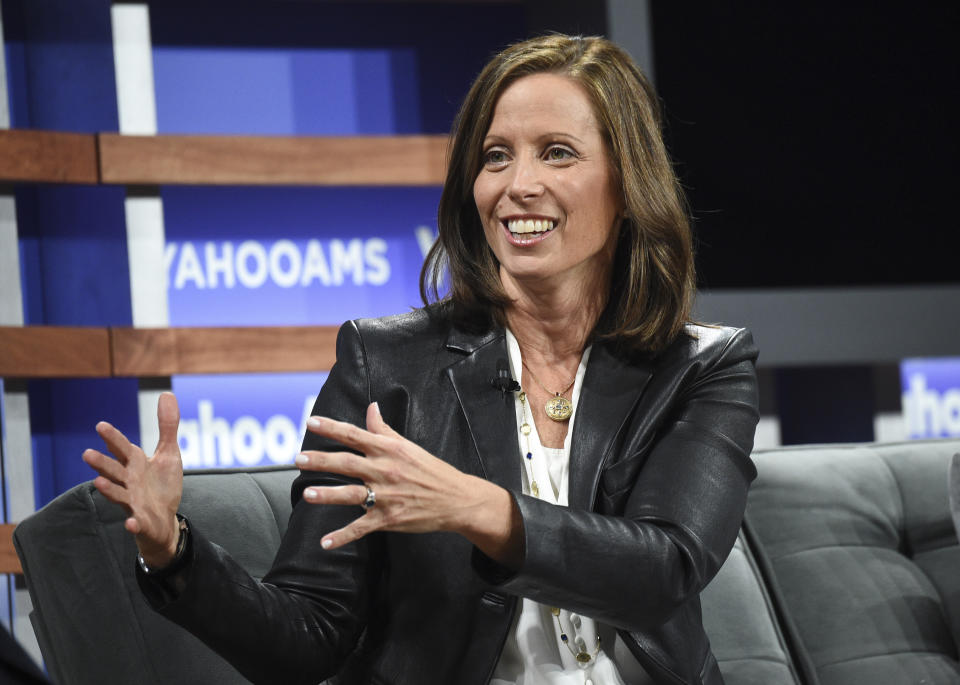Nasdaq CEO on Chinese listings: We don't want to 'choke off access to capital,' but standards must be met
Nasdaq President and CEO Adena Friedman says it’s important that U.S. public markets remain open and available to Chinese companies, but accounting and transparency standards must be met.
“It is very much a global competitive landscape for capital formation. So, the exchanges in China and Hong Kong are highly competitive in terms of trying to attract companies that are domiciled in China to come and list there. But, then, we still have a lot of companies from China also looking to tap the public markets,” Friedman said in a wide-ranging interview at the Yahoo Finance All Market Summit: Road to Recovery, held at the Nasdaq MarketSite on Monday.
This year’s boom in initial public offerings has been characterized by a large share of new floatations being done in China’s markets rather than on U.S. exchanges. More recently, at $34.5 billion, Ant Group, the world's biggest IPO, will list its shares in Shanghai and Hong Kong, eschewing U.S. markets.
For Chinese companies, it’s a “great opportunity to realize they have a lot of choice.” At the same time, Friedman continued, it’s important to ensure that the U.S. public markets remain open and available to companies coming from China and the broader Asia region.
“[That’s] where some politics have come into the mix in recent months, that we are cautious about making sure that when a company comes to the U.S., that they are vetted the way that they should be, of course, and that the audit firms are living by the same standard as anyone, any other jurisdiction.”
It’s important for the U.S. not to “choke off access to capital by making it so the barriers to entry are too high,” she added.
“It’s been an interesting time for us to manage through a global capital competitive landscape, and at the same time making sure that the companies come here live up to the standards we expect.”
People started realizing, investors have a lot of cash to put to work. Nasdaq president and CEO Adena Freidman
To be sure, the U.S. has also seen a strong IPO market, especially for the Nasdaq. In the third quarter, the Nasdaq welcomed 144 new listings, including 105 IPOs, with $25.7 billion raised, versus 41 IPOs in the same period a year ago. In the first nine months, the Nasdaq brought on 174 IPOs, with $43.2 billion raised.
“Before the pandemic hit the world, we expected to have really strong year for IPOs. We saw a lot of demand really building as we exited 2019. In fact, we had about 190 IPOs last year as well. So, it as a busy year last year, and we saw that we could end up having an even busier year this year. But when the pandemic hit, we saw massive disruption. Every IPO was put on pause and we weren’t sure what was going to happen.”
Amid the uncertainty back in April, even Friedman thought that 2020 could be a much slower year than initially thought. However, when IPOs started trickling out, beginning with a health care IPO, followed by ZoomInfo (ZI), and “people started realizing, investors have a lot of cash to put to work.”

“There are not a lot of other asset classes that can deliver them returns and yield because of the fact the Fed brought down interest rates so low, so they say, ‘Gosh, in order for us to be able to meet our investors’ needs, we need to look at putting risk capital to work,’ and equities was the best option.”
By June, IPO activity revealed a “very healthy environment growing.” The listings space has also become the “year of the SPAC,” with these blank-check companies bring companies to the public markets.
“We’re very pleased ... 80% of all operating companies going public so far this year have chosen Nasdaq (^IXIC), and then about 50% in the third quarter of the SPACs have come to Nasdaq as well. So we have had a very, very robust year, so far, in IPOs.”
Julia La Roche is a correspondent for Yahoo Finance. Follow her on Twitter.
Find live stock market quotes and the latest business and finance news
For tutorials and information on investing and trading stocks, check out Cashay
Follow Yahoo Finance on Twitter, Facebook, Instagram, Flipboard, LinkedIn, and reddit.
